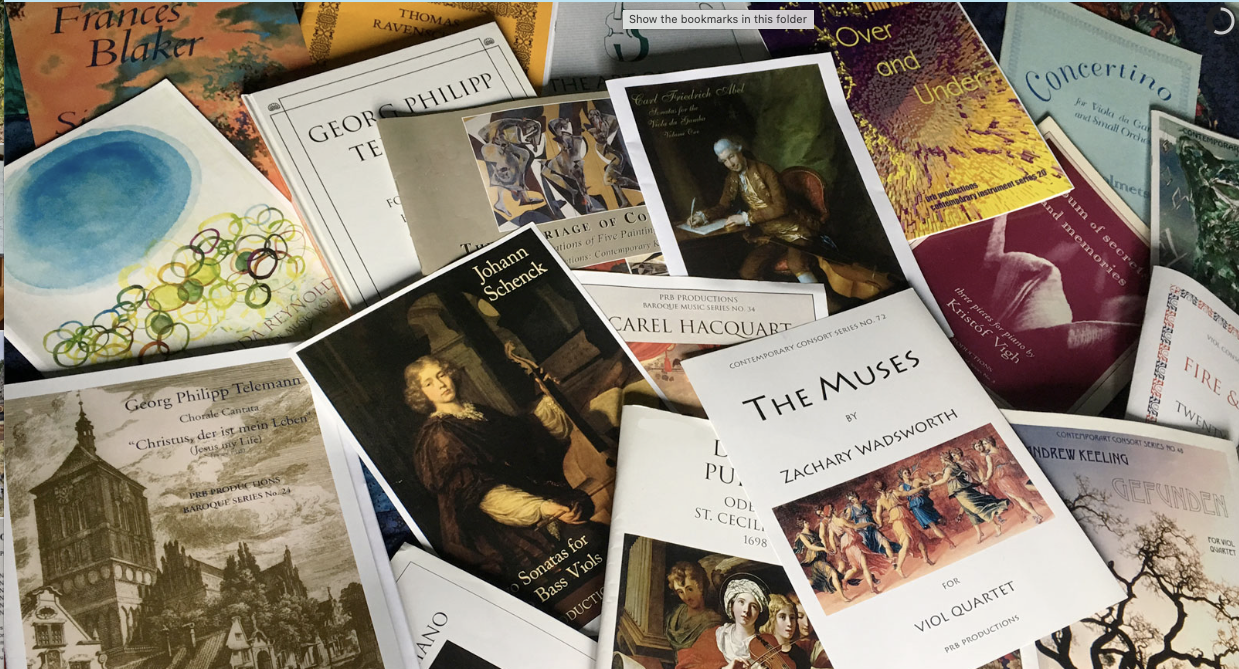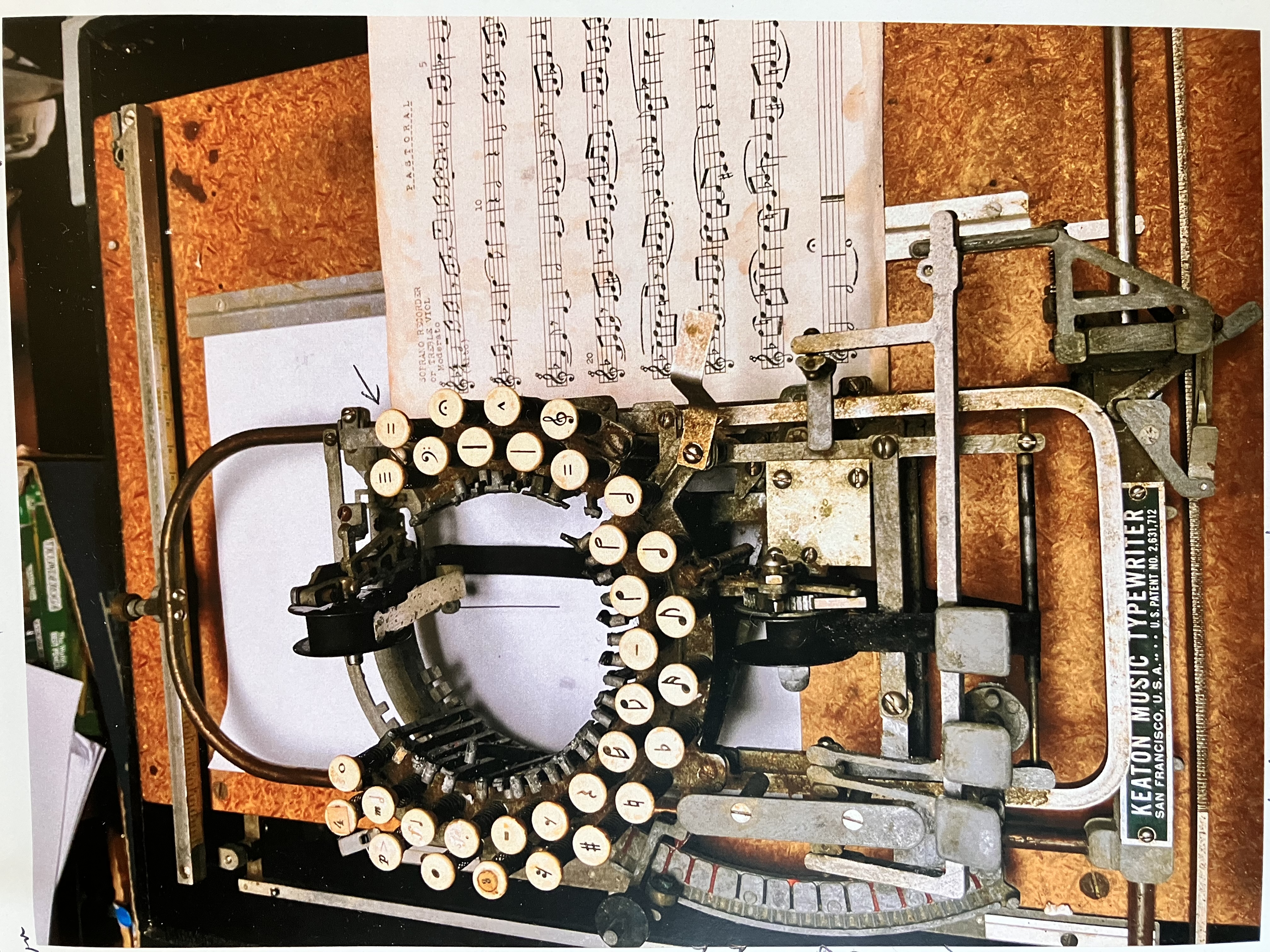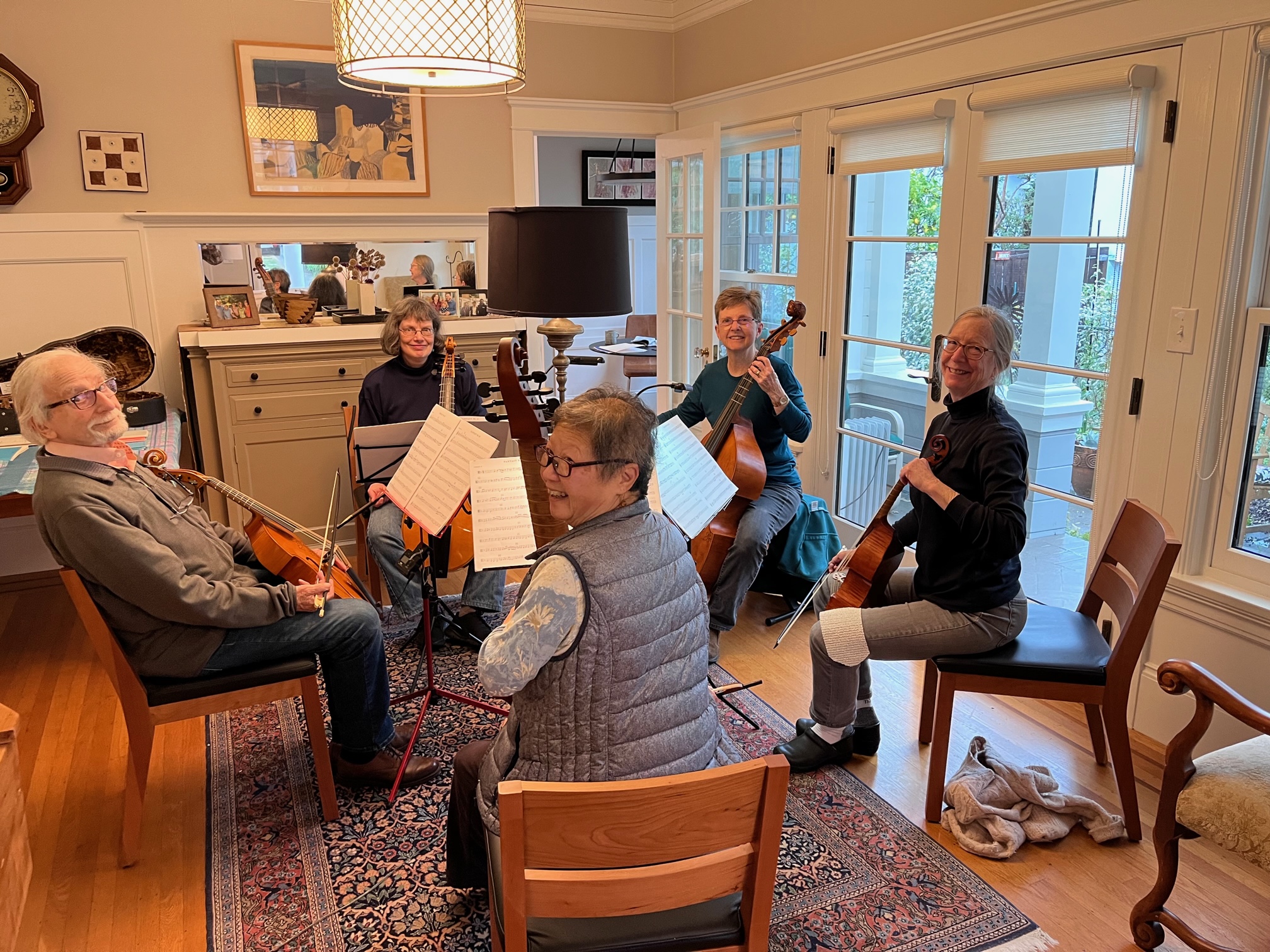Music Publisher PRB Productions Closes June 30
 By Nick and Sue Jones
By Nick and Sue Jones
One of the early music world's most beloved resources is closing its doors after June 30, 2023. For 34 years, PRB Productions, run by husband-and-wife team Peter Ballinger and Leslie Gold, has issued finely edited and beautifully printed editions of music for the recorder, viol, and assorted other instruments from their home in Albany, California.
Many will be familiar with PRB's editions, always scrupulously researched and printed with a careful eye for what performers need most—starting cues and pitch ranges, clear noteheads, spacing that supports the music's rhythms, and scholarly notes—all on beautiful high-quality archival paper.
PRB's extensive catalog has over 350 works, most of which include scores and parts in multiple clefs. One important pedagogical book in the catalog is Frances Blaker’s Recorder Player’s Companion -- one of their best-sellers. A third of the catalog offers contemporary music, primarily for the viol and the recorder, including such familiar names as Martha Bishop, Harold Owen and Peter Seibert (as well as Peter Ballinger).
Peter—a chemical researcher by profession—learned the recorder as a youth, inspired to practice by hearing Carl Dolmetsch play in London in 1948. As a teenage recorder and clarinet player, he copied out by hand the clarinet parts of Brahms and Schubert symphonies so he could play along with the recordings. At university, he played both clarinet and timpani.
After moving to the Bay Area from the UK in 1959, Peter founded the Marin Recorder Consort, writing out all their arrangements by hand. As a member of the late Donald Pippin's Goliard Players early music ensemble, he performed for the Young Audiences program, visiting all of the Junior Highs and many of the High Schools in the Bay Area during the course of three years.
In the 60’s and 70’s he performed frequently at the Old Spaghetti Factory in San Francisco, playing chamber music gigs on alto and sopranino for Donald Pippin (well known for his still-thriving Pocket Opera company). At the 1970 Carmel Bach Festival he performed the first recorder solo in the Fourth Brandenburg Concerto, using a new A-415 pitch alto which had arrived from England with days to spare!
Peter was also a faculty member at several ARS recorder workshops, and conducted three or four annual workshops in Mendocino, CA, which included the intensive study of contemporary music for recorder ensemble. He also arranged and composed chamber music for recorders, winning a prize for his Double Quartet.

Peter began learning about music publishing early on, though without a plan to eventually make it a business. As an opera pit clarinetist at university, he was handed illegible parts and decided he needed to rewrite them by hand, which took him two weeks but said “I learned a lot about notation and musical calligraphy.” In the 1960s, when good recorder consort arrangements were hard to come by, Peter found a Keaton music typewriter to create new editions. That typewriter was a contraption of daunting complexity that demanded hours of precision labor to produce a page of music.
After retiring from his career at Chevron in 1987, Peter abandoned the typewriter for the computer, producing editions using the pioneering music software called SCORE, invented by a Stanford professor. As Peter noted, SCORE stood out from other programs for its sensitive handling of the spacing of notes. Peter has managed to keep that software running despite its discontinuance—and expects to continue to use it for his own composing, as well as producing scores of orchestral music from Mozart to Mahler for his own pleasure. “It’s a thrilling process to hear a piece as each new part is added,” he says, adding that he is able to use his preferred tempo markings among other unique elements.
In 1998, the one-man enterprise gained a new energy when Peter married Leslie Gold, a journalist, whom he’d met at a Fretwork workshop for viols in Oxford, UK. In her college days at Oberlin, Leslie, an oboe player until then, had taken up the viol in a group organized by oboe-professor-and-gamba-player James Caldwell. Years later Leslie rediscovered the tenor viol after being recruited into a Renaissance dance band during law school in Washington, DC. ("It kept me sane.”) She remembers those costume gigs in a hoop skirt as quite a challenge. They both continue to be active viol consort players with friends in the Bay Area.
Initially PRB depended on commercial printers, but since 2000 the two of them have created their editions completely in-house—edited, printed, trimmed, folded, stapled, and mailed out. With Leslie's added administrative skills, PRB's sales grew rapidly, and so too did PRB's catalog of newly researched early music.
Peter and Leslie collaborated with scholars around the world—former Bay Area musicians Louise Carslake and John Dornenburg (who researched PRB's extraordinary series of the Telemann Fortsetzsung des Harmonischen Gottesdientes cantatas, edited by Jeanne Swack), Australian musicologist Richard Charteris and British musicologist Virginia Brookes, among many others.
Recorder editions of special note? “Peter Seibert's Ten Bass Hit is unusual for ten bass recorders. Carousel was one of our earliest publications, by the late Leonie Jenkins. Hans Staeps was my favorite recorder composer, but we were too late for most of his editions, although we did manage to secure East-West for recorder quartet and guitar, one of his last compositions.”
PRB also became a favorite and influential venue for contemporary composers with a historical bent—including Peter Ballinger himself. Peter Seibert remembers PRB's generosity and encouragement of new music. He notes that because of PRB's international marketing, "My music has now appeared on five continents. I could never have dreamed of such distribution without the generosity and encouragement of Peter and Leslie."
Composer Will Ayton speaks of PRB's legacy in both old and new music. PRB has "resurrected the music of the past with publications that are much more than scholarly editions—functional, visually accessible, and professionally accurate." And he notes, "PRB's support of new music has given today's recorder and viol players a chance to expand their horizons and to explore the music of our time on early instruments."
PRB was also a "propelling force" for San Francisco educator and composer Belinda Reynolds. She told us that PRB "took the gamble of underwriting the costs for my Custom Made Music Series. Thanks to Leslie’s commitment to the business end of things and Peter’s spectacular engraving work, I have been blessed to have a body of work out in the world. I still own my copyrights, a rare and honorable action in the music publication business."
Educator (now actress) Carol Herman remembers the drama behind her popular PRB edition of Tuneful Etudes for Tenor Viol: "Leslie and Peter pursued me relentlessly to compose what they assured me were badly needed tenor viol etudes, insisting I pick up my bow and get to work! Finally convinced, I then had to borrow a tenor viol because I no longer owned any instruments. I’d sit in my West Hollywood apartment, scribbling down new ideas to mail off for the collection. They did the rest with their eternal patience and skill."
Carol surely speaks for our entire community of musicians: “PRB Productions has been OURS; the most wonderful team and service any of us could ask for."
June 30 is the deadline to order music from PRB Productions. To order or request a PDF of their catalog, email PRBPrdns@aol.com or call 510-526-0722.
Nick Jones is a recorder player and music reviewer for Classical Voice (sfcv.org). Sue Jones is newsletter editor for Pacifica Viola da Gamba Society. They live in Berkeley, CA.
 Clockwise from left: Peter Ballinger, Leslie Gold, Sue Jones, Mary Prout, Linda Quan
Clockwise from left: Peter Ballinger, Leslie Gold, Sue Jones, Mary Prout, Linda Quan



 By Nick and Sue Jones
By Nick and Sue Jones Peter began learning about music publishing early on, though without a plan to eventually make it a business. As an opera pit clarinetist at university, he was handed illegible parts and decided he needed to rewrite them by hand, which took him two weeks but said “I learned a lot about notation and musical calligraphy.” In the 1960s, when good recorder consort arrangements were hard to come by, Peter found a Keaton music typewriter to create new editions. That typewriter was a contraption of daunting complexity that demanded hours of precision labor to produce a page of music.
Peter began learning about music publishing early on, though without a plan to eventually make it a business. As an opera pit clarinetist at university, he was handed illegible parts and decided he needed to rewrite them by hand, which took him two weeks but said “I learned a lot about notation and musical calligraphy.” In the 1960s, when good recorder consort arrangements were hard to come by, Peter found a Keaton music typewriter to create new editions. That typewriter was a contraption of daunting complexity that demanded hours of precision labor to produce a page of music.